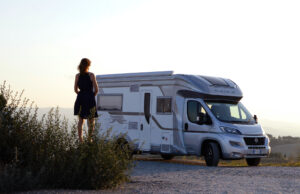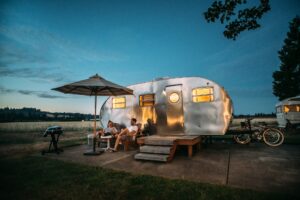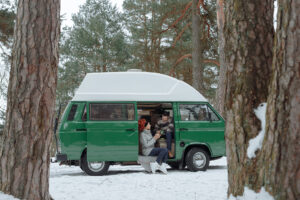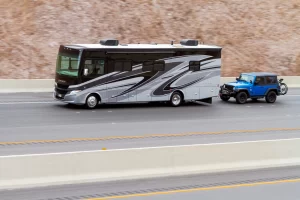The winding mountain passes, and endless horizons call to you. Another sweeping vista leaves you awestruck. A steep trail tempts your sense of adventure. The freedom of the open road continues to beckon – but is your current RV holding you back?
As a travel trailer owner, do you sometimes feel limited by towing capacity, storage space, or lack of amenities? Naturally, no RV is perfect. But perhaps your needs have evolved over time and outgrown the trailer you once adored.
Upgrading to a motorhome opens up an exciting new world of possibilities. There’s no shame in seeking more from your RVing lifestyle.
This guide will help you weigh the pros and cons of sticking with a trailer versus leveling up to a motorhome. We’ll explore key differences, benefits, costs, and important factors to consider. Let’s hit the road!
Motorhomes Vs. Trailers: Key Differences to Understand
Before comparing the pros and cons, it’s essential to understand what distinguishes these two recreational vehicle types. Clarity on the core features and purposes of each will provide the knowledge needed to make an informed decision.
After all, a motorhome and a trailer are two entirely different animals. You wouldn’t want to compare apples to oranges, would you?
What Exactly is a Motorhome?

Motorhomes combine transportation and habitation into one self-contained vehicle. An integrated engine allows you to effortlessly drive your home on wheels wherever impulse takes you. There is no need for a tow vehicle or unhitching.
Motorhomes typically fall into three main classes:
Class A – The largest type, constructed on a heavy-duty bus chassis. Class A motorhomes feature spacious, luxury accommodations.
Class B – Also called camper vans. These nimble RVs have converted vans with raised roofs to allow standing. Tighter quarters but excellent maneuverability.
Class C – Built on a truck chassis with an attached cabover sleeping space. A happy medium offering good space and easier handling.
In addition to the living area, motorhomes contain a fully equipped kitchen, bathroom, bedrooms, seating, and entertainment space. The all-in-one convenience provides freedom and flexibility unmatched by any other RV type.
Note that almost any larger vehicle can be converted into a motorhome, so there are plenty of options.
How Do Travel Trailers Differ?

Travel trailers offer a towable alternative to motorhomes. Lightweight construction and compact floor plans improve fuel efficiency when hitched to an SUV or pickup truck. Without a built-in engine, trailers must rely on your tow vehicle to reach their destinations.
However, no mechanical components means trailers provide a smaller, more affordable option. While motorhomes aim to inhabit the journey itself, travel trailers prioritize comfortability once parked at your vacation spot. Two different RVing styles and goals.
Still, travel trailers offer all your basic amenities. You’ll find sleeping quarters, kitchenettes, seating dinettes, and some basic amenities. Bathrooms may be compact wet baths. Storage space is more limited. But the focused purpose results in budget-friendly prices for RVing.
Comparing Interior Layouts
An important difference to consider is how the living space is configured in each type of RV. As you evaluate upgrades, pay attention to standard floorplan options and decide what works best for your needs. However, you can always build a custom floor plan that meets your needs.
Motorhome Floor Plan Considerations
Class A motorhomes offer the most spacious floorplans, some over 40 feet long. Multiple slide-outs and separated rooms provide a true residential feel. Choose from master suites, walk-in closets, full bathrooms with showers, and residential appliances.
Class B camper vans sacrifice square footage for maneuverability. Floorplans creatively convert seating to beds and integrate space-saving bathrooms. The intimate layouts limit occupancy to 2-4 people.

Class C motorhomes balance livability and convenience. Floor Plans include cabover beds, sleeping areas, kitchens, and convertible dinettes. Bathrooms are compact. Overall, it is a happy medium suitable for families.
Travel Trailer Floorplans
Travel trailers range tremendously in size from small 10-foot trailers to expansive fifth-wheel suites. Bunkhouse models work well for families with kids, while couples may opt for just a master bedroom.
Kitchenettes include a fridge, stove, and sink with dinette seating nearby. Wet baths, which combine shower and toilet into one, are most common, but some floor plans have separate baths. The iconic Teardrop trailers (referring to their shape) allocate interior space efficiently with compact kitchens in the back and sleeping areas in front.

Consider your needs and research different trailer floorplans. Whether you desire two beds or 4, a trailer offers options on a budget; you should choose the layout that best suits your needs.
The Benefits of a Motorhome
It’s only natural to feel hesitant about change. Your trusted trailer still holds wonderful memories. But reminiscing about the “good old days” can prevent us from moving forward. Weigh the motorhome benefits below to see if your needs could be better fulfilled:
More Possibilities for Spontaneous Travel
Many RVers crave more freedom but feel limited by towing capacity or the need to reserve campsites. That’s where our first advantage point for motorhomes comes in. Owners can stop on a whim when something catches their eye. No need to unhitch or even find a designated area. Just pull over and relax like you would in any other vehicle.

Traveling in a motorhome means your home’s facilities are always onboard. Hungry? Whip up a snack without unhitching the trailer. Tired? Pull into a rest stop and nap in the bedroom. Need a bathroom? Use your own anytime. Play cards or watch a movie together while on the road. It simplifies travel tremendously.
With a motorhome, you have the flexibility to chase adventure wherever the open road leads. No strings attached. Just drive to create your own journey.
Liberation from the Hassles of Towing
Ask many RVers, and they’ll tell you a properly weighted motorhome drives much more easily than towing a trailer. That’s because motorhomes drive more like a car, while towing requires a different set of skills (Ever see a semi-truck driver reverse?). Making tight turns, changing lanes, and backing into sites are all simpler without a hitch pivot point.
You can also breathe easy without sway concerns that accompany trailers, especially at higher speeds or in windy conditions. And you don’t need to slowly creep along highways while other traffic zips past. Motorhomes make comfortable cruising speeds attainable again. Just load up and drive safely to your destination.
No more stressful white-knuckle driving or damage risks from exceeding your tow capacity. Just you, the horizon, and the welcoming road ahead.
Opportunity to Explore More Boondocking Locations
Do you enjoy getting off the grid but find trailer limitations restrict your options? It’s true; when you want to stop somewhere with a trailer, you must consider clearance to unhitch and a trailer-friendly parking space.

A motorhome’s exceptional maneuverability allows you to wind through remote areas inaccessible before. Narrow forest service roads. Secluded beaches. Quaint towns with tricky parking. Wherever your heart desires! No more avoiding picturesque areas due to trailer length restrictions or backing challenges.
With sufficient ground clearance, you can camp at unimproved sites lacking hookups. Your motorhome contains everything needed for comfortable off-grid stays. It makes it easy to wander freely and boondock to reconnect with nature.
Avoid the Burden of Towing a Second Vehicle
We all know how much of a nuisance it is to tow a vehicle along with a trailer. Repeatedly hitching, unhitching, and reparking the car wastes valuable playtime. Plus, it adds potential for accidents or damage.
With a motorhome, simplify travels down to one powered vehicle. No need to haul extra weight and complications. Plus, adding a second vehicle might mean buying a new one outright if you don’t already own one.
More Comfort for Passengers and Pets
For family travelers, children, and elderly passengers stay safer and more comfortable in motorhome seats than constantly belted into a tow vehicle. Pets also benefit from room to move about instead of getting frequently crated.
A motorhome allows everyone to stretch out and relax. Play games together at the dinette. Take a nap on the sofa. Grab water from the fridge. Use the bathroom anytime. Your home’s amenities and comforts are always within reach on the road.
Motorhome Perks for Different RVing Lifestyles
The next step in our motorhome vs. trailer debate involves considering your lifestyle. Not everyone requires the same features from their recreational vehicle. Maybe you only plan to camp once yearly at your favorite spot. Or maybe you want to travel full-time and never look back.
After reflecting on your travel priorities, you may find a motorhome better fulfills the following:
Full-Time RV Living

A motorhome provides residential space and storage capacity for full-time occupancy. Slide-outs create expansive living areas, and larger models boast separate bedrooms and multiple bathrooms.
Enjoy home amenities like laundry, entertainment centers, and plenty of kitchen space. Set up your motorhome homestead anywhere for months on end and live comfortably without the need for hotels or reservations.
Extended Travel
Speaking of which, wandering for weeks across the country is simpler when you don’t need lodging each night. Skip the hefty hotel fees, lengthy research, and troublesome reservations. Just drive to a new location whenever desired with your comfortable home rolling right along with you!
No more packing, hauling luggage, or constantly breaking down camp either. Wake up, brew some coffee, and hit the road rejuvenated. A motorhome allows you to focus on people, not logistics, during extended stays anywhere.
Frequent Weekend Getaways
With a motorhome, last-minute trips are a breeze! You won’t need to constantly spend time hitching up or packing prep. Simply toss in some clothes and food and immediately zip off. Spontaneity is the best spice for mini vacations!
Even quick day trips become more feasible without repeatedly hooking up your trailer to come and go. The convenience removes obstacles to getting away more often.
Important Things to Consider Before Upgrading
Now that you’re well-informed let’s close out with a few things you can write down or ponder as you plan a motorhome upgrade. While the benefits sound enticing, change also warrants pragmatic consideration.
Upfront Costs and Ongoing Expenses
There’s no skirting around the fact motorhomes require a hefty upfront investment. Look realistically at new and used pricing in your desired class.
While motorhomes simplify travel logistics, the upgrade also impacts your finances long-term. Weigh the costs and value for your individual situation. Will splurging now on convenience limit future funds for adventures? Or does it offer benefits that align with your savings? Here are some costs to consider:
Upfront Costs – Motorhomes have higher base prices. But, travel trailers still require an adequate tow vehicle. Consider total costs when starting from scratch.
Fuel Efficiency – Low mileage for motorhomes. But trailers reduce capacity and gas mileage for your tow rig. Fuel costs depend on the total miles driven.
Insurance – Motorhomes cost more to insure than trailers. Yet, you need policies for both trailer and tow vehicles, so determine total insurance costs.
Maintenance – More mechanical systems mean pricier motorhome maintenance. Repairs for truck vs SUV tow vehicles vary greatly, so assess your total maintenance obligations. Make sure to find an expert RV maintenance service in your area!
Camping Costs – Both allow boondocking to reduce site fees. But more amenities and higher capacity in a motorhome may encourage pricier camping.
Make a thorough cost comparison when budgeting for an upgrade. While motorhomes require greater upfront investment, benefits like simplified travel logistics can pay off long-term.
Finding the Ideal Floorplan
Once you select a motorhome class, take plenty of time to carefully assess different floorplans. Weigh your needs versus wants. Ask yourself:
- How many slide-outs are necessary?
- Do you require separate bedroom suites?
- What about laundry facilities?
- How much living and storage space is truly needed?
- What is the quality of construction materials and workmanship?
Comparison shop until your perfect new or used motorhome is found. Never settle out of impatience – this is your home! Wait for the right fit.
Where Will You Park and Store It?
Measure your garage, driveway, or storage space beforehand to ensure adequate room. If storing for months, evaluate winterizing logistics and security requirements. Storage facilities can usually accommodate motorhomes but always measure.
If downsizing due to limited space, consider a nimbler Class B camper van. While your new home is on wheels, practical factors like where to keep it still apply. Make sure parking and storage needs align.
Get Comfortable Handling a Larger Vehicle
Finally, test driving is a must before upgrading! Seek professional training on properly maneuvering and reversing your anticipated motorhome class. Take your time getting comfortable behind the wheel.
Consider starting with a compact Class C if you’re accustomed to a trailer. Ease into the transition before attempting a 40-foot Class A bus. Patience and practice are key. Soon, that initial fear will become confidence.
Let the Adventures Begin!
If your needs align better with a motorhome’s convenience after weighing options, then start getting excited! You are officially ready to trade limitations for liberation. There are countless floor plans and features to explore when you upgrade.
At Leisure Coachworks, we specialize in motorhome upgrades and remodeling. Our experienced team helps owners transform ordinary recreational vehicles into the motorhome of their dreams. From minor renovations to complete custom luxury conversions, we handle upgrades both big and small.
Contact us today for more information!

